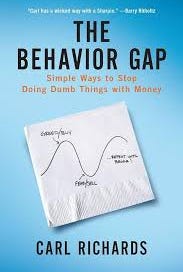Why We Keep Doing Dumb Things With Money (And How to Stop)
A Friendly Kick in the Assets From Carl Richards
If you've ever looked at your bank statement and thought, "Why did I do that?" Carl Richards gets you. In The Behavior Gap: Simple Ways to Stop Doing Dumb Things with Money, Richards, a certified financial planner and master sketch artist, shines a light on the gap between what we should do with our money and what we actually do. This book isn’t about stock picks or retirement calculators; it’s about YOU—your fears, habits, impulses, and the very human tendencies that sabotage your financial success. Perfect for readers who love behavioral science, hate jargon, and want financial advice that feels like a conversation over coffee.
It’s Not the Market. It’s You.
Richards introduces the term "the behavior gap" to describe the difference between investment returns and investor returns. In essence, we underperform our own investments because we make emotional decisions: buying high, selling low, panicking during market drops, and chasing trends. His mission? Help you recognize these behaviors and make better, calmer, values-aligned financial decisions. This book is more mindset shift than money manual—and that's its magic.
What Makes It Different
Unlike typical finance books, The Behavior Gap avoids overwhelming you with charts or formulas. Instead, Richards combines storytelling, wit, and hand-drawn napkin sketches to break down big ideas into bite-sized, relatable truths. He redefines "smart money" as simply aligning your financial behavior with your values. Simplicity is the star here, not sophistication.
Chapter-by-Chapter Breakdown
We Don’t Beat the Market, the Market Beats Us: Most of us lose money not because of bad investments but because of bad timing driven by fear and greed.
The Perfect Investment: Spoiler – it doesn’t exist. Perfection is the enemy of good investing.
Ignore Advice, Make Fun of Forecasts: Financial predictions are mostly noise. Trusting them is dangerous.
Financial Life Planning: Money should serve your life goals, not the other way around.
Too Much Information: We’re drowning in data. More info doesn’t mean better decisions.
Plans Are Worthless: But planning is invaluable. Flexibility matters more than perfection.
Feelings: Acknowledging emotions helps you manage them. Ignoring them makes things worse.
You’re Responsible for Your Behavior: You can’t control outcomes, but you can control your reactions.
When We Talk About Money: Money conversations are emotional. Richards urges more empathy and less judgment.
Simple. Not Easy: Good financial decisions are often simple but rarely easy. Doing nothing is sometimes best.
Who Should Read This Book?
Anyone who's ever made a panicked investment decision, felt overwhelmed by financial "expertise," wanted their money to reflect their personal values, or considered working with a financial advisor will find this book especially relevant and reassuring. Great for fans of Morgan Housel, James Clear, or Brene Brown, this book is perfect for professionals, young investors, and even seasoned savers looking for a mindset reset.
The Behavior Gap is like financial therapy—insightful, honest, and surprisingly comforting. It won’t give you a stock tip, but it might just save your portfolio from you. Richards' blend of humility, humor, and humanity makes this a standout in the crowded personal finance space. It earns a solid rating of 9 out of 10. This is not just a book about money. It’s a book about you and how to stop letting your worst instincts run the financial show. Read it, reflect on it, and maybe even sketch your own behavior gap.
Disclaimer: The information provided is not intended to replace professional financial advice tailored to your unique situation. Despite our best efforts to ensure the accuracy and timeliness of the information presented here, we make no express or implied representations or warranties about its completeness, accuracy, reliability, suitability, or availability. Any reliance you place on such information is solely at your own risk. Please be advised that the content herein is not financial advice. It is highly recommended that you seek personalized financial advice from a professional.



